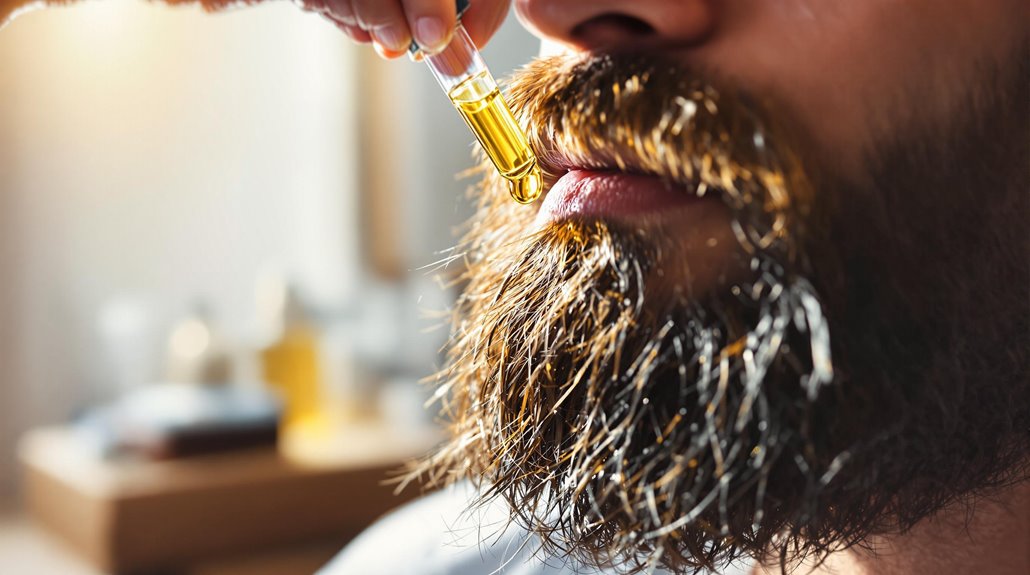What Are the Disadvantages of Beard Oil?

Using beard oil has its downsides. You might experience allergic reactions if sensitive to common ingredients like almond oil, leading to redness and itching. Skin irritation is another risk, especially with cheap oils that clog pores and cause acne. Low-quality ingredients can dry out your beard, making it prone to breakage. Over-application creates a greasy appearance and contributes to clogged pores. Strong fragrances may cause discomfort or affect social interactions. Opt for unscented or lightly scented oils to avoid overwhelming scents. Keep in mind that understanding these issues and how to navigate them can improve your grooming experience.
Potential Allergic Reactions
When exploring beard oil options, it's vital to be aware of potential allergic reactions that might arise from common ingredients. Many beard oils contain almond oil, which can trigger allergies in some individuals. Symptoms like redness, itching, and burning sensations on your skin are tell-tale signs of an allergic reaction. To avoid such discomfort, always perform a patch test by applying a small amount of the oil on a less visible skin area. This simple precaution lets you monitor for any adverse reactions before fully using the product.
Vital oils, often included in beard oils for fragrance and benefits, can also pose risks. Sensitive individuals may experience skin issues, especially when these oils aren't properly diluted. A quality beard oil will have transparent ingredient lists, allowing you to identify potential allergens and avoid them. Unfortunately, the risk of allergic reactions increases with poorly formulated oils containing synthetic fragrances or low-quality ingredients. Choosing products with high-quality, natural components is important to minimizing such risks. Always prioritize beard oils that emphasize ingredient transparency and quality to keep your skin healthy and your beard looking its best.
Risk of Skin Irritation
Some may overlook the risk of skin irritation when using beard oil, but it's a genuine concern. Many users experience redness, burning sensations, or even rashes because of allergic reactions to certain ingredients. Vital oils, often found in beard oil, can cause sensitivity, especially if you have pre-existing skin conditions. It's important to be aware of how your skin reacts to new products.
If you're not careful, poorly formulated beard oils can exacerbate skin irritation. Those that contain cheap or synthetic ingredients might leave your skin dry and uncomfortable. You might think more is better, but excessive application can clog pores, leading to acne and other skin problems. Clogged pores can trap oil and bacteria, making irritation worse.
To avoid these issues, start with gradual application. Introduce beard oil to your routine slowly to see how your skin responds. This way, you can identify any adverse reactions without overwhelming your skin. Pay attention to any signs of irritation and adjust your usage accordingly. Being mindful of the ingredients and how your skin reacts can help you enjoy the benefits of beard oil without unnecessary discomfort.
Issues With Ingredient Quality

Focusing on the quality of ingredients in beard oil is vital for maintaining a healthy beard. When you choose a beard oil, you're not just picking a scent; you're investing in the health of your facial hair. Unfortunately, many beard oils on the market contain cheap ingredients that might compromise your beard's health. Poor-quality oils often lack the key nutrients needed for a strong, manageable beard, leading to dryness, breakage, and tangles over time.
Be wary of synthetic fragrances and low-quality additives. These components can irritate your skin, causing discomfort or even triggering allergic reactions. It's important to examine the ingredient list and verify transparency, as misleading labeling can result in a product that doesn't meet your quality expectations.
Additionally, lower-priced options might contain oxidized oils. These oils lose their efficacy and can sometimes cause negative skin reactions, especially if they haven't been stored properly. They might offer an attractive price point, but they can end up costing you more regarding skin health and beard care.
Greasiness and Clogged Pores
Applying beard oil in excess can lead to an unsightly greasiness that makes your beard look dirty instead of well-groomed. This happens because too much oil creates a shiny, slick appearance that not only feels uncomfortable but also detracts from a clean, polished look. If you've got oily skin, adding more oil can worsen the situation, leading to an imbalance in your skin health. It's essential to find the right amount that keeps your beard looking healthy without overdoing it.
The greasiness isn't just about appearance. It can also cause clogged pores, which is a significant concern for maintaining healthy skin. When beard oil builds up on your skin, it traps dirt and bacteria, potentially leading to acne or other skin irritations. This is particularly problematic if you don't cleanse your face regularly, as the oil can accumulate, affecting both skin and beard health.
Additionally, certain oils are more prone to causing greasiness, making it tough for your skin to breathe. This can lead to discomfort and a heavy, weighed-down feeling. Aim to use beard oil sparingly and choose formulations that suit your skin type to avoid these issues.
Fragrance Sensitivities
Fragrances in beard oils can be a double-edged sword, especially if you're sensitive to scents. Many beard oils contain strong fragrances that might overwhelm your senses, causing discomfort or even allergic reactions. If you have fragrance sensitivities, applying these oils could lead to irritation rather than the intended pleasant experience. It's not just about your comfort; those around you might also find your chosen scent overpowering, especially in close quarters.
Personal preferences for scents vary widely, so a fragrance you love might be irritating or unpleasant to someone else. This can affect social interactions, as people with scent sensitivities might find it hard to be around you. In professional settings, awareness of scent intensity is essential. Strong fragrances can be distracting or inappropriate, and not everyone appreciates their presence.
Moreover, overwhelming fragrances in beard oils can clash with other personal care products you use. This can create an unpleasant olfactory experience, turning what should be a simple grooming task into a complex balancing act. When choosing a beard oil, consider opting for unscented or lightly scented versions if you or those around you have fragrance sensitivities. This guarantees a more harmonious experience for everyone involved.





